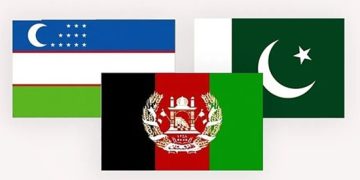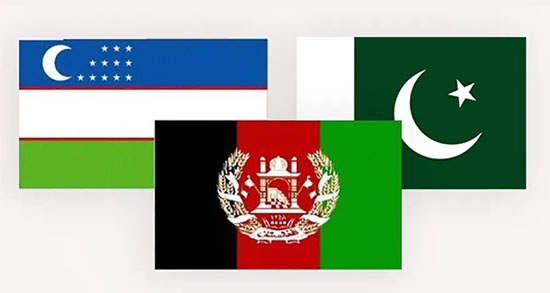By Brig.(R) Akhtar Nawaz Janjua
Peace in Afghanistan is of utmost importance for both Pakistan and Uzbekistan for smooth trade and sustained economic activity through Afghanistan Uzbekistan for trilateral use of Pakistan ports of Gwadar and Karachi. Pakistan and Uzbekistan earnestly desire peace, progress and stability in Afghanistan for better and fully coordinated economic activity between these and other states in the region. Pakistan and Uzbekistan have utilized the routes passing through Afghanistan and the region by shipment of Cargoes from Karachi to Tashkent and from Tashkent to Faisalabad Pakistan. Uzbekistan and Afghanistan, agreed upon construction of the Mazar-i-Sharif-Kabul-Peshawar Railway Line in February 2021, a 600-km track to be built over five years besides the already existing long-distance railroad between Hairatan and Mazar-e-Sharif, stretching nearly 47 miles.This new route will also afford a survey of the large deposits of minerals in Afghanistan that are located near the proposed route. If they can be recovered, these mineral riches will usher in a new era of prosperity for Afghanistan and the entire region. Security within Afghanistan, however, will be the deciding factor for both construction of Railway Line and tapping of the mineral resources.Uzbekistan and Pakistan have demonstrated a great desire to move ahead on bilateral coordination for assisting Afghanistan on all issues confronting it. The U.S.-Afghanistan-Uzbekistan-Pakistan Quad and the (SCO) Platforms can be of a huge assistance in this regard. As regards recognition of Afghanistan government of Taliban, States will recognize when and if it suits them, however, Uzbekistan and Pakistan, are helping Taliban and Afghanistan to surmount the obstacles they face in bringing peace and stability in their country. Afghanistan needs to fight and eliminate the Islamic State, al-Qaida, the Islamic Movement of Uzbekistan, Tehreek-e-Taliban Pakistan, and the East Turkestan Islamic Movement. To quote from a document from another platform, “South and Central Asia are focusing on geoeconomics, so what will be the US response now that it has left the region? Though some observers think the US left Afghanistan in order to pursue a broader geo-economic strategy and be the “balancing” force between Russia and China in the region, Washington’s staying power is in doubt and it has’t demonstrated any talent for turning political advantage to money in any arena other than weapons sales. In Iraq, instead of pressing for the best oil deals for U.S. firms, it ceded the field to others; in Afghanistan, it wasted 20 years when it could have been promoting American interests to exploit the country’s trillion dollar mineral deposits. The disorder Washington left behind will push the minerals payday farther over the horizon. America’s stewardship in the country has also seen a steady increase in opium poppy cultivation, which is likely contributing to the heroin epidemic in Russia, which Moscow will lay at the feet of the US”. Narco trade other than regional connectivity is therefore another area where Pakistan and Uzbekistan can help Afghanistan and in fact are ever eager to do that. For connectivity, Pakistan and Uzbekistan, consider long-term peace and stability in Afghanistan critical and agree that peace and regional connectivity are mutually reinforcing. Recognizing the historic opportunity to open flourishing international trade routes, Pakistan and Uzbekistan have shown very clear intentions to cooperate to expand trade and build transit links and strengthen business-to-business ties. Pakistan and Uzbekistan have underlined the need of global efforts to provide economic and humanitarian assistance to Afghanistan to avoid economic crisis there. The resolve came during a meeting between Pakistan’s former Prime Minister Imran Khan and President of Uzbekistan Shavkat Mirziyoyev. The two leaders agreed that a peaceful, stable and prosperous Afghanistan is vital for regional stability as well as for realisation of infrastructure and connectivity projects. Shared bonds of faith, history and culture, marked by cordiality and close cooperation can yield the positive results without a doubt. As said earlier that a stable and peaceful Afghanistan is in the best interest of region particularly and world at large. Therefore, existence and penetration of terror structure to other countries in the region has to be stopped at all cost. RATS and Pakistan’s huge experience in dealing with the terror can be a launchpad for cooperation to wipe out the terror in situ. It must be the resolve of all states in the region that destabilising forces have to be defeated at all costs. Additionally, dozens of other agreements between Pakistan and Afghanistan, Pakistan and Uzbekistan and Uzbekistan and Afghanistan exist including power transmission lines, trade, security and many other fields. Pakistan is for peace in Afghanistan and in the region. We have suffered a lot both in terms of blood and treasure due to war in Afghanistan. We want a stable and prosperous Afghanistan and so does Uzbekistan. We facilitated the peace process in Afghanistan, fought the war on terror internally, looked after millions of Afghan refugees for more than four decades, exercised strategic restraint in the face of extreme aggressive provocations from India. Pakistan earnestly desires economic interdependence, regional connectivity and development partnerships and seeks to settle all disputes through meaningful dialogue amicably. Of course, the Afghans and their Government will have to work overtime to achieve stability, peace and prosperity which is their right and which they and all other states in the region also desire. Pakistan, Uzbekistan and other states in the region do not want any spillovers and at the same time must resolve not to provide safe sanctuaries on their lands to dissidents and disruptive forces from anywhere. Peace, Progress, Prosperity, Cooperation, Coordination and will to forge ahead on issues must be the objective for all to achieve. ( The writer is founding member of CSAIS Islamabad and the article is based on his speech at an online conference, ‘Uzbekistan’s Chairmanship in the SCO: way forward for greater development of regional connectivity’.





